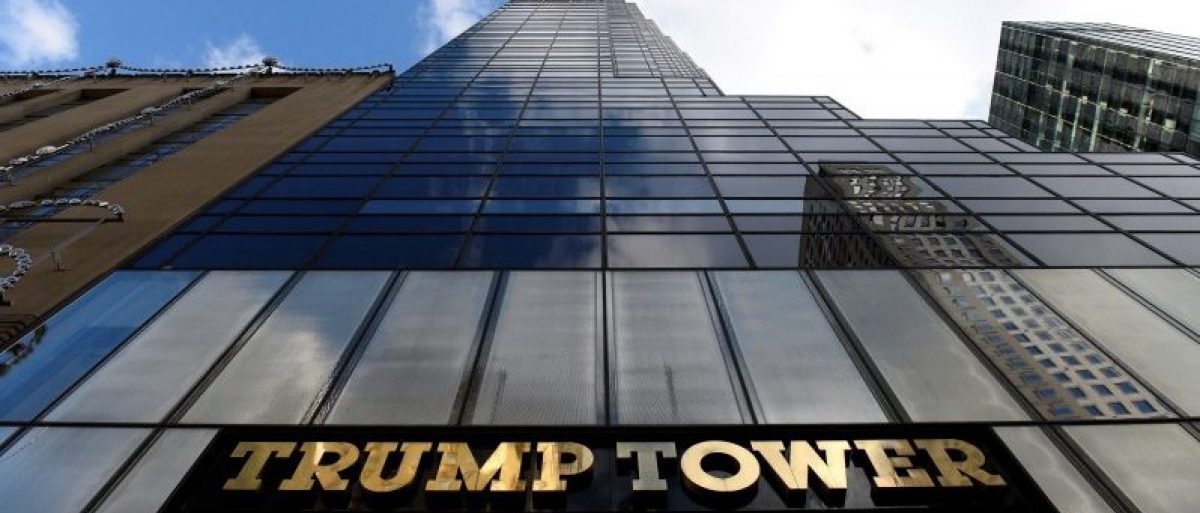 A new lawsuit filed by a liberal advocacy organization Monday in federal court alleges that President Donald Trump is in violation of the Constitution’s Emoluments Clause.
A new lawsuit filed by a liberal advocacy organization Monday in federal court alleges that President Donald Trump is in violation of the Constitution’s Emoluments Clause.
The clause precludes federal officials from accepting gifts from foreign powers. The lawsuit argues Trump is violating the clause because many of his firms do business with foreign governments. Among other alleged violations, lawyers point to space the Chinese government rents at Trump Tower in New York as an example of an unconstitutional emolument. China also helped finance another property in which Trump holds a significant stake.
“The framers of the Constitution were students of history,” Deepak Gupta, one of the lawyers behind the suit, told the New York Times . “And they understood that one way a republic could fail is if foreign powers could corrupt our elected leaders.”
Eric Trump, executive vice president of the Trump Organization, called the suit a political stunt.
“This is purely harassment for political gain, and, frankly, I find it very, very sad,” he said.
During a brief exchange with the press on Monday morning in the Oval Office, the president said the challenge was “totally without merit.”
The lawsuit is organized by an advocacy group called Citizens for Responsibility and Ethics in Washington (CREW). A number of accomplished lawyers and legal scholars are leading the effort, including Laurence Tribe, the legendary Harvard Law School professor; Erwin Chemerinsky, dean of the law school at the University of California, Irvine; and Richard Painter, an ethics lawyer in the George W. Bush White House.
Other legal scholars are dubious of their theory of the Emoluments Clause. Professor Andy Grewal of the University of Iowa College of Law argued in a recent paper that transactions conducted between foreign governments and the Trump Organization do not violate the Constitution, because Trump does not himself participate in those transactions. He argues the term “emolument” refers to specific benefits individuals accrue by personally providing services, and does not reach ordinary exchanges done at market value by business entities that they might own. (RELATED: Jared Kushner Can Lawfully Work In The White House, Justice Dept. Says)
Before reaching arguments on the merits, the group will have to prove it has the right to bring the lawsuit in the first place. To bring a suit against another person or entity, plaintiffs must demonstrate that they have “standing” to sue. Therefore, CREW must demonstrate that they are injured in some fashion by the Trump Organization’s dealings with foreign governments. What’s more, that injury must be a specific and particularized, not generalized or theoretical harm.
Ian Milhiser of ThinkProgress, a liberal legal commentator who is skeptical of the suit, argues a business competitor may have an easier time establishing standing. That view is also shared by Brianne Gorod, chief counsel at the Constitutional Accountability Center. Milhiser also notes that, as the Supreme Court explained in Lujan v. Defenders of Wildlife — an important standing case — that a plaintiff must show a “causal connection between the injury and the conduct complained of,” which could prove a tall order for CREW.
For their part, CREW points to a 1982 Supreme Court decision that allowed a civil rights group to sue a landlord after it deployed black clients to broach the possibility of signing a lease with building managers. In the past, those arguments have received a friendly hearing from the 2nd U. S. Circuit Court of Appeals, and the federal court in New York City, where this lawsuit will be filed.
It is not yet clear who will represent Trump in the litigation.
Follow Kevin on Twitter
Send tips to [email protected] .
Content created by The Daily Caller News Foundation is available without charge to any eligible news publisher that can provide a large audience. For licensing opportunities of our original content, please contact [email protected].






